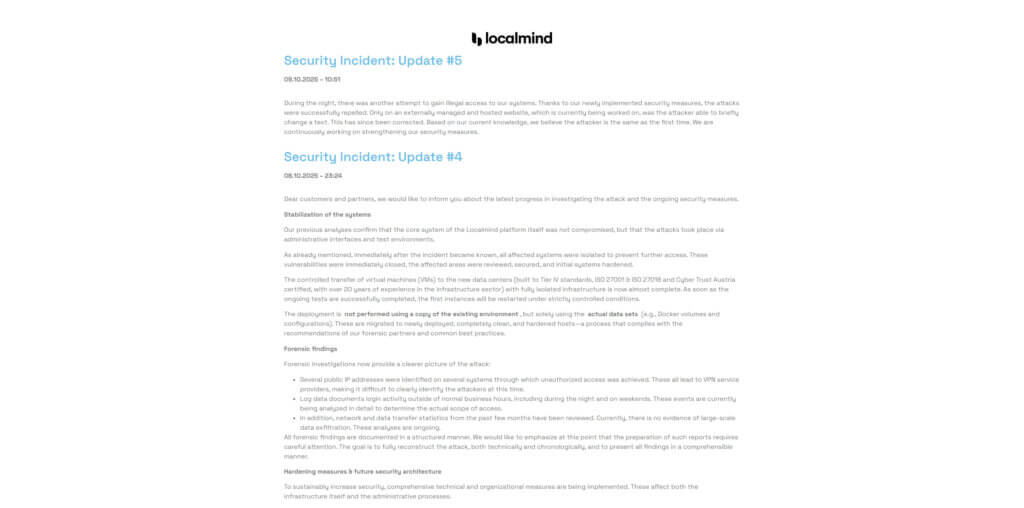An Austrian AI vendor that built its brand on “local and secure” deployments is contending with a serious breach of trust. On 5 October 2025 Localmind detected a security incident, took core systems offline, and began publishing rolling updates while it investigated. The company says an unauthorized party accessed parts of its infrastructure and emailed customers and partners, and it has pledged support with regulatory notifications.
The initial intrusion vector was not a novel exploit. According to Heise’s reporting, a researcher created an account on a publicly reachable Localmind instance that was immediately granted administrative privileges. From there, read-only access to an internal knowledge base was possible, and that store contained infrastructure details and access credentials that were not consistently protected. Heise viewed samples of plaintext server root passwords, some trivial variants, which the researcher provided as proof.
From that foothold, the researcher claims to have accessed customer material that the Localmind platform could reach, including mailboxes, CRM and ERP data, and document stores. He shared packages of invoices, contracts, court filings, and account records with tokens or passwords with affected organizations and select media. Localmind has acknowledged weaknesses in how credentials were safeguarded and says it has shut down relevant systems and is auditing the environment.

The blast radius appears broad but uneven. Documents reviewed by Heise list more than 150 entities, largely in Austria and Germany, across banks, public authorities, energy providers, a diocese, and hotels. Several organizations say their exposure was limited to test systems and non-sensitive data, and Localmind emphasizes it has no indication that on-premise LLMs operated by customers were affected.
Early local reporting adds color at the municipal level. Innsbruck Tourism said its IT was touched because of a vulnerability at a Tyrolean AI provider, but it reported no evidence of data theft. This aligns with the mixed impact picture emerging as customers assess logs and revoke credentials.
Other outlets have amplified the timeline and the vendor’s response. BornCity published screenshots of Localmind’s notices and corroborated the shutdown of affected services while scoping the breach. Trending Topics reported the potential scale and quoted Localmind saying only a limited number of customer systems were actually accessed, with the data protection authority informed. These accounts track with the company’s own status notes.
The disclosure path is contentious. Heise reports the researcher bypassed the usual private coordinated process, arguing that the issues were foundational and symptomatic of development practices that favored speed over basic security hygiene. Regardless of that debate, the core lesson is not exotic: when an AI operator centralizes connectors into customer systems, any weakness in its identity and secrets management becomes a single point of compromise for everything those connectors can see.
Several near-term steps are obvious and urgent for customers. Rotate any credentials ever stored in or synchronized with the provider’s systems, review OAuth grants and service principals for mail, storage, and ERP integrations, and comb access logs for anomalous queries from the provider’s IP space during the affected window. Localmind says it is contacting impacted clients individually as verification completes, but organizations should not wait to begin containment.
The incident is a test case for the promise and peril of “local” AI. Proximity to data centers and GDPR jurisdiction do not automatically confer security. What matters is whether the operator enforces least privilege, isolates tenants, keeps credentials out of wikis and issue trackers, and treats every external instance as production. Localmind’s public posture has been contrite and transparent so far. The credibility of that stance now depends on a full accounting, concrete remediation, and third-party verification that the design flaws behind this breach are eliminated rather than patched over.







